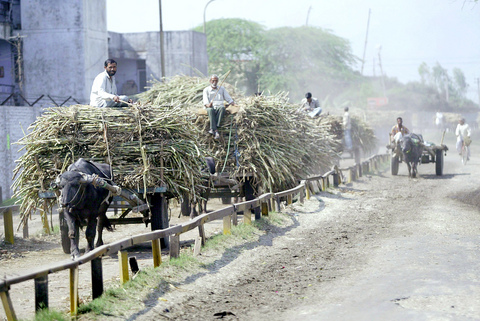Indians know better than to eat the plum-sized fruit of the wild jatropha bush. It's poisonous enough to kill.
But with oil prices surging, the lowly jatropha is experiencing a renaissance of sorts -- as a potential source for fuel for trucks and power stations. The government has identified 39.2 million hectares of land where jatropha can be grown, hoping it will replace 20 percent of diesel consumption in five years.
"We have found that we can produce biodiesel from it. If we can keep the price down, the future looks bright," said R.K. Malhotra, who oversees the Indian Oil Corp's research center that is running tests on the oil.

PHOTO: AP
India isn't alone. All across Asia, governments are searching for crops that can help them offset a dependence on imported oil that can only skyrocket as their economies soar. Palm oil and sugar cane are the dominant crops in the region, but everything from coconuts to castor oil to cow dung is being tested for fossil-fuel alternatives such as ethanol and biodiesel.
Most experts also believe that, using current technologies, there isn't enough land to make a serious dent in oil consumption. Some scientists say production will consume more conventional energy than it will save, and environmentalists came out this month against plans by Indonesia to convert millions of hectares of rain forest on the island of Borneo into palm oil plantations.
Georgia Tech professor Arthur Ragauskas, who co-authored a study of biofuels that was published in Science magazine, sees other potential pitfalls.
"One criticism of biofuels is that if you want to go from 2 percent to 20 percent, you would have to direct so much of that agriculture from food to fuel that there would be real competition between the two," he said in a telephone interview.
"Even worse, if we have a famine in part of the world, we would have to make a decision as a society between food or fuel," he said.
For now, alternative fuels are less than 1 percent of current fuel usage in most of Asia, and experts say their large-scale use is years if not decades away.
Still, "Every country in Asia is trying to commercialize and put up legislation on biofuels," said Conrado Heruela, a renewable energy specialist with the UN Food and Agriculture Agency.
"Right now, the target is not that big but it will be very significant in the long term," he said.
On some Pacific islands, whose isolation makes oil imports more costly and vulnerable to market shifts, power companies are looking for other sources.
"The use of alternative fuels is very much the topic of the moment among the small utilities in the Pacific," said Jean Chaniel, the general manager of Unelco Vanuatu, whose company runs some generators on 5 percent coconut oil.
The Fiji Electricity Authority plans to switch entirely to renewable energy by 2011.
India says it wants to increase its use of renewable energy from the current 5 percent to 25 percent by 2030. Much of this will come from nuclear plants, but it is also examining wind power and other methods including jatropha.
About half of India drives on gasoline with 5 percent ethanol, and the government aims to increase that to 20 percent in the next decade.

The CIA has a message for Chinese government officials worried about their place in Chinese President Xi Jinping’s (習近平) government: Come work with us. The agency released two Mandarin-language videos on social media on Thursday inviting disgruntled officials to contact the CIA. The recruitment videos posted on YouTube and X racked up more than 5 million views combined in their first day. The outreach comes as CIA Director John Ratcliffe has vowed to boost the agency’s use of intelligence from human sources and its focus on China, which has recently targeted US officials with its own espionage operations. The videos are “aimed at

STEADFAST FRIEND: The bills encourage increased Taiwan-US engagement and address China’s distortion of UN Resolution 2758 to isolate Taiwan internationally The Presidential Office yesterday thanked the US House of Representatives for unanimously passing two Taiwan-related bills highlighting its solid support for Taiwan’s democracy and global participation, and for deepening bilateral relations. One of the bills, the Taiwan Assurance Implementation Act, requires the US Department of State to periodically review its guidelines for engagement with Taiwan, and report to the US Congress on the guidelines and plans to lift self-imposed limitations on US-Taiwan engagement. The other bill is the Taiwan International Solidarity Act, which clarifies that UN Resolution 2758 does not address the issue of the representation of Taiwan or its people in

US Indo-Pacific Commander Admiral Samuel Paparo on Friday expressed concern over the rate at which China is diversifying its military exercises, the Financial Times (FT) reported on Saturday. “The rates of change on the depth and breadth of their exercises is the one non-linear effect that I’ve seen in the last year that wakes me up at night or keeps me up at night,” Paparo was quoted by FT as saying while attending the annual Sedona Forum at the McCain Institute in Arizona. Paparo also expressed concern over the speed with which China was expanding its military. While the US

SHIFT: Taiwan’s better-than-expected first-quarter GDP and signs of weakness in the US have driven global capital back to emerging markets, the central bank head said The central bank yesterday blamed market speculation for the steep rise in the local currency, and urged exporters and financial institutions to stay calm and stop panic sell-offs to avoid hurting their own profitability. The nation’s top monetary policymaker said that it would step in, if necessary, to maintain order and stability in the foreign exchange market. The remarks came as the NT dollar yesterday closed up NT$0.919 to NT$30.145 against the US dollar in Taipei trading, after rising as high as NT$29.59 in intraday trading. The local currency has surged 5.85 percent against the greenback over the past two sessions, central